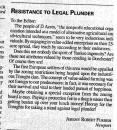Free Subscription! 
iTunes ![]()
Our podcast will keep you up to date...
Intellectual Property Kills Gingerbread Man
Posted on: January 17, 2009 - 1:09pm
A tragic end to an intellectual property despute over CAKES. Man dies, leaves wife and children behind. This is so sad.
http://www.dailymail.co.uk/news/article-1118843/The-gingerbread-man-kill...






Wow, that really is sad. I remember chatting with Sheldon Richman once, and getting into the subject of patent and copyright protection. He said it succinctly: "government-enforced patent and copyright are irreconcilable with freedom."
So, what kind of a paradigm would you recommend to handle this kind of problem, where people have similar products to put out at the same time?
So, what kind of a paradigm would you recommend to handle this kind of problem, where people have similar products to put out at the same time?
Let them differentiate through trademarks (using the original definition of "trademark", not the made-up legal definition).
Government is not a necessary evil. Rather, it is an evil of such great power that it has been able to convince us of its necessity.
What is the original definition of a trademark?
A unique and original mark (as in an image). Its originality is what makes such a mark capable of distinguishing the origin of a product. Words are common to all speakers of a language, so trademarking words is a contradiction in terms. But an image can be so distinct as to leave no question.
The issue should be whether a party to a trademark dispute is making a fraudulent claim by using a similar description as the other party, and the answer is "no". The products are clearly distinguishable by the packaging, the actual contents of the packaging, and where people go to buy it for pete's sakes. But under trademark law, it is not a question of fraud, it is a matter of the government granting rights to intellectual properties that do not actually exist, and enforcing them even in cases of vague coincidence.